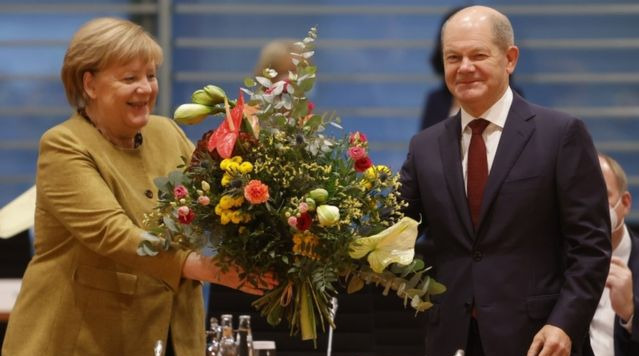
Olaf Scholz has been Merkel's deputy chancellor since 2018 and is now set to take over from her. Reuters
By Guillermo Alvarado
More than just a change of government is happening in the Federal Republic of Germany today, Wednesday, as an entire era came to a close with the handover of office from Angela Merkel to her successor, Olaf Scholz, ending a 16-year administration that had great repercussions inside and outside Europe.
Unlike many other politicians, he ended four consecutive terms in office with a very high local and international approval and trust rating of 72 percent, according to a survey conducted a few days ago by the Pew Institute, which speaks highly of his work.
Born on July 17, 1954 in Hamburg, she grew up and studied in the former German Democratic Republic, where her family moved when she was only three months old.
She earned a doctorate in physics at the University of Leipzig and it was not until the fall of the Berlin Wall in November 1989 that she entered political life under the guidance of Helmut Khol, whom she considered her mentor.
She rose quickly through the political ranks: between 1991 and 1998 she was a member of parliament, Minister for Women and Youth and Minister for the Environment, and in April 2000 she won the presidency of the Christian Democratic Union, which, in alliance with the Social Democrats, took her to the post of Federal Chancellor in 2005.
Angela Merkel, who continued to use her first husband's surname even though she is now married to Joachim Sauer, will be remembered for her ability to adapt to changing times, even against the will of her supporters, and for some controversial decisions that marked her administration.
After the global financial crisis of 2008, he was ruthless with Greece and other economically weak countries in the European Union and pushed through severe austerity and financial adjustment programs, with disastrous effects for millions of disadvantaged families.
Yet in 2015, with virtually no consultation with its continental partners, it opened Germany's doors to hundreds of thousands of migrants crowding Europe's borders.
She maintained a firm position towards the United Kingdom during the process of London's separation with the EU group, the so-called "brexit", and became a sort of retaining wall in the face of the outbursts of former U.S. President Donald Trump.
The first woman to govern Germany during its history as a republic was, of course, a representative of the capitalist system, with its contradictions and chiaroscuros, which are usually darker than clear, but at the end of the day she left a legacy of efficiency and honesty in the management of the affairs of the so-called "European locomotive".

